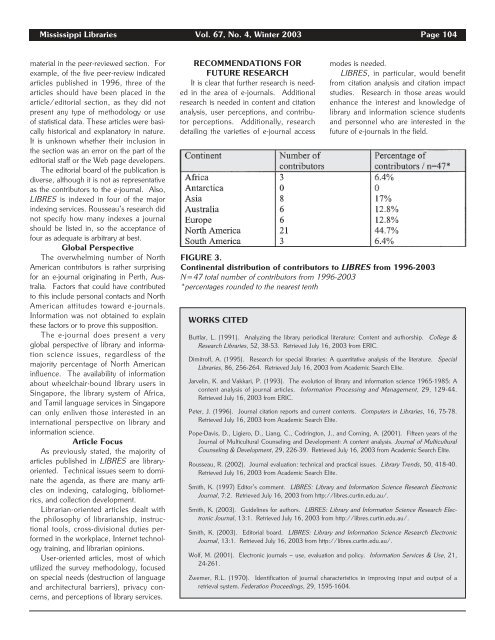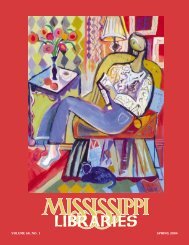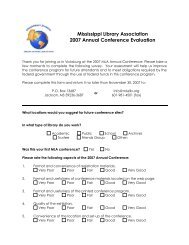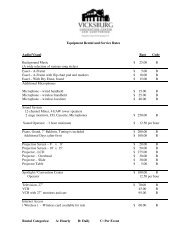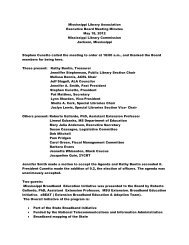Full Text (PDF) - Mississippi Library Association
Full Text (PDF) - Mississippi Library Association
Full Text (PDF) - Mississippi Library Association
Create successful ePaper yourself
Turn your PDF publications into a flip-book with our unique Google optimized e-Paper software.
<strong>Mississippi</strong> Libraries Vol. 67, No. 4, Winter 2003 Page 104<br />
material in the peer-reviewed section. For<br />
example, of the five peer-review indicated<br />
articles published in 1996, three of the<br />
articles should have been placed in the<br />
article/editorial section, as they did not<br />
present any type of methodology or use<br />
of statistical data. These articles were basically<br />
historical and explanatory in nature.<br />
It is unknown whether their inclusion in<br />
the section was an error on the part of the<br />
editorial staff or the Web page developers.<br />
The editorial board of the publication is<br />
diverse, although it is not as representative<br />
as the contributors to the e-journal. Also,<br />
LIBRES is indexed in four of the major<br />
indexing services. Rousseau’s research did<br />
not specify how many indexes a journal<br />
should be listed in, so the acceptance of<br />
four as adequate is arbitrary at best.<br />
Global Perspective<br />
The overwhelming number of North<br />
American contributors is rather surprising<br />
for an e-journal originating in Perth, Australia.<br />
Factors that could have contributed<br />
to this include personal contacts and North<br />
American attitudes toward e-journals.<br />
Information was not obtained to explain<br />
these factors or to prove this supposition.<br />
The e-journal does present a very<br />
global perspective of library and information<br />
science issues, regardless of the<br />
majority percentage of North American<br />
influence. The availability of information<br />
about wheelchair-bound library users in<br />
Singapore, the library system of Africa,<br />
and Tamil language services in Singapore<br />
can only enliven those interested in an<br />
international perspective on library and<br />
information science.<br />
Article Focus<br />
As previously stated, the majority of<br />
articles published in LIBRES are libraryoriented.<br />
Technical issues seem to dominate<br />
the agenda, as there are many articles<br />
on indexing, cataloging, bibliometrics,<br />
and collection development.<br />
Librarian-oriented articles dealt with<br />
the philosophy of librarianship, instructional<br />
tools, cross-divisional duties performed<br />
in the workplace, Internet technology<br />
training, and librarian opinions.<br />
User-oriented articles, most of which<br />
utilized the survey methodology, focused<br />
on special needs (destruction of language<br />
and architectural barriers), privacy concerns,<br />
and perceptions of library services.<br />
RECOMMENDATIONS FOR<br />
FUTURE RESEARCH<br />
It is clear that further research is needed<br />
in the area of e-journals. Additional<br />
research is needed in content and citation<br />
analysis, user perceptions, and contributor<br />
perceptions. Additionally, research<br />
detailing the varieties of e-journal access<br />
WORKS CITED<br />
modes is needed.<br />
LIBRES, in particular, would benefit<br />
from citation analysis and citation impact<br />
studies. Research in those areas would<br />
enhance the interest and knowledge of<br />
library and information science students<br />
and personnel who are interested in the<br />
future of e-journals in the field.<br />
FIGURE 3.<br />
Continental distribution of contributors to LIBRES from 1996-2003<br />
N=47 total number of contributors from 1996-2003<br />
*percentages rounded to the nearest tenth<br />
Buttlar, L. (1991). Analyzing the library periodical literature: Content and authorship. College &<br />
Research Libraries, 52, 38-53. Retrieved July 16, 2003 from ERIC.<br />
Dimitroff, A. (1995). Research for special libraries: A quantitative analysis of the literature. Special<br />
Libraries, 86, 256-264. Retrieved July 16, 2003 from Academic Search Elite.<br />
Jarvelin, K. and Vakkari, P. (1993). The evolution of library and information science 1965-1985: A<br />
content analysis of journal articles. Information Processing and Management, 29, 129-44.<br />
Retrieved July 16, 2003 from ERIC.<br />
Peter, J. (1996). Journal citation reports and current contents. Computers in Libraries, 16, 75-78.<br />
Retrieved July 16, 2003 from Academic Search Elite.<br />
Pope-Davis, D., Ligiero, D., Liang, C., Codrington, J., and Corning, A. (2001). Fifteen years of the<br />
Journal of Multicultural Counseling and Development: A content analysis. Journal of Multicultural<br />
Counseling & Development, 29, 226-39. Retrieved July 16, 2003 from Academic Search Elite.<br />
Rousseau, R. (2002). Journal evaluation: technical and practical issues. <strong>Library</strong> Trends, 50, 418-40.<br />
Retrieved July 16, 2003 from Academic Search Elite.<br />
Smith, K. (1997) Editor’s comment. LIBRES: <strong>Library</strong> and Information Science Research Electronic<br />
Journal, 7:2. Retrieved July 16, 2003 from http://libres.curtin.edu.au/.<br />
Smith, K. (2003). Guidelines for authors. LIBRES: <strong>Library</strong> and Information Science Research Electronic<br />
Journal, 13:1. Retrieved July 16, 2003 from http://libres.curtin.edu.au/.<br />
Smith, K. (2003). Editorial board. LIBRES: <strong>Library</strong> and Information Science Research Electronic<br />
Journal, 13:1. Retrieved July 16, 2003 from http://libres.curtin.edu.au/.<br />
Wolf, M. (2001). Electronic journals – use, evaluation and policy. Information Services & Use, 21,<br />
24-261.<br />
Zwemer, R.L. (1970). Identification of journal characteristics in improving input and output of a<br />
retrieval system. Federation Proceedings, 29, 1595-1604.


